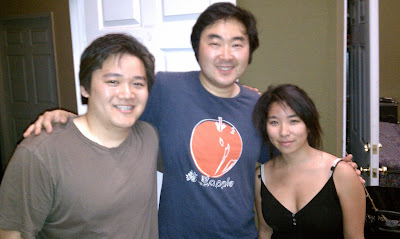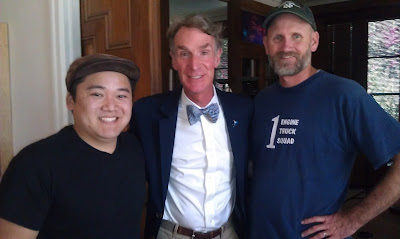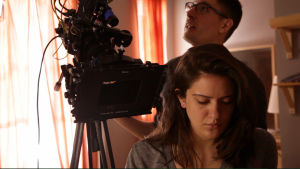I've often said that some people show up on set their first day and just seem to get it. Instinctively they seem to know what needs to get done, and the best way to do it. They are immediately wanted by every department to be part of their team, and are hired back again and again. Others, just don't seem to have a clue. They are in the way, they have to be explained things over and over. The production moves slower because they are involved. I was one of the latter. I just didn't get it. In fact I had to stop doing movies, and come back making my own in order to learn what was needed, and WHY it was needed. I had to view things from the top down to get it.
I've often wondered what the difference between these two types are, and while I think it's mostly innate, there are a few philosophies you can espouse that will help you.
1) Remember, you are not there to be creative. That is not your function EVER. You are there to serve the creative people who have been hired to be creative. It's not that you're not creative, or that people don't think you are. It's just not your job to be creative... yet. When telling this to someone recently, he asked if he made just one suggestion a day, would it be out of line (he meant to the director on our super micro set)? I said one suggestion a month would be out of line. You think that your director, who has directed five feature films, is going to want to be given ideas from some kid on his very first shoot? Don't ever, EVER think of yourself as a creative.
Yet there will be important ways to be creative: How to creatively get six coffee cups in a container that holds four; how to get your car from point A to point B the fastest without getting a ticket; how to get pedestrians to walk around the set in a way that won't make them upset or disrupt the crew. These are your creative concerns. If you do your job creatively you'll be well liked, if you try to suggest thoughts or opinions about what the Creative team is doing you will be fired.
2) You are there to WORK. Don't ever forget that your job is to kick butt. Don't ever feel like you're being ill used for being told to work... even if the work seems pointless. Don't ever allow yourself to be standing around with no purpose. A lot of times you will find yourself with nothing to do. Do something. Ask someone if you can help them. Ask people if they need anything. Bring your immediate supervisor a water. Pick up garbage in the street. Get a wet-wipe and clean cables. NEVER stand and watch. When you're told to hold up pedestrians, face the directions the pedestrians are coming, don't face the production. You will not see someone coming and they will slip past you. Do YOUR job well.
3) Some crews require PAs to be standing up always. I don't make that a requirement. BUT if I see a PA sitting I wonder why they're sitting. Don't sit. Stand. Expect to stand for 12 hours. If your AD or Production Manager says you can sit while doing something, then you can do it. If you don't like that, get a job in post (you'll be dying to stand).
4) Don't worry that you don't know what a Half Apple or a C-47 are. You'll learn. Tell people, this is my first movie, so I don't know what that means. Once you are told, NEVER forget. You don't want to have to be told twice. Be sure to ask questions, to the people that you are working with directly. Buy the book STRIKE THE BABY AND KILL THE BLONDE, an imperfect reference book of film terms. It will get you started. When I was on my first shoot the DP told me to "86 that rug." I sat there blinking, trying with all my might to figure out what 86 means. He simply said, "It means move it." I quickly moved it saying, "Sorry, first movie." No worries. I never had to be told what it meant again.
5) You will work 12-16 hour days. Expect it. Anything less is a gift. Don't check your watch and let it eat you up. Don't tell your friends you'll meet them at 8, then worry about having to cancel. Just face the fact you will have no family or social life during the duration of the production. If you have a boyfriend or a girlfriend, you might want to just break up before a long shoot. You might meet someone on set anyway. A great movie to watch for many reasons is Truffaut's Day For Night. There's a great line it: I would leave a boy for a movie, but I'd never leave a movie for a boy.
Follow these simple directions and you should do fine. You may not have the innate skill that some of the Naturals have, but you should make it through without getting fired, and may even be asked to come back again.
One of the naturals I've had the pleasure to work with was Drew Sugimoto. Drew showed up to work for free on the set of our film Surrogate Valentine in 2010, invited by his friend and fellow PA Minore Nishime. Drew only worked a few days, but he was clearly a smart guy and a hard worker, and someone I wanted to keep hanging out with.
 |
| Drew Sugimoto (left), lead actor of Surrogate Valentine Goh Nakamura (center), Minore Nishime (right) in 2010 |
Three years, and six films later, in three different states, I'm still hiring him whenever I can - for more and more challenging duties. So what can you learn from Drew? Work hard and be a good person, and you'll be the sort of person people want to have back.
 |
| On the set of An Honest Liar, Drew Sugimoto (left), Bill Nye the Science Guy (center), Duane Andersen (right) in 2013 |



.jpg)






